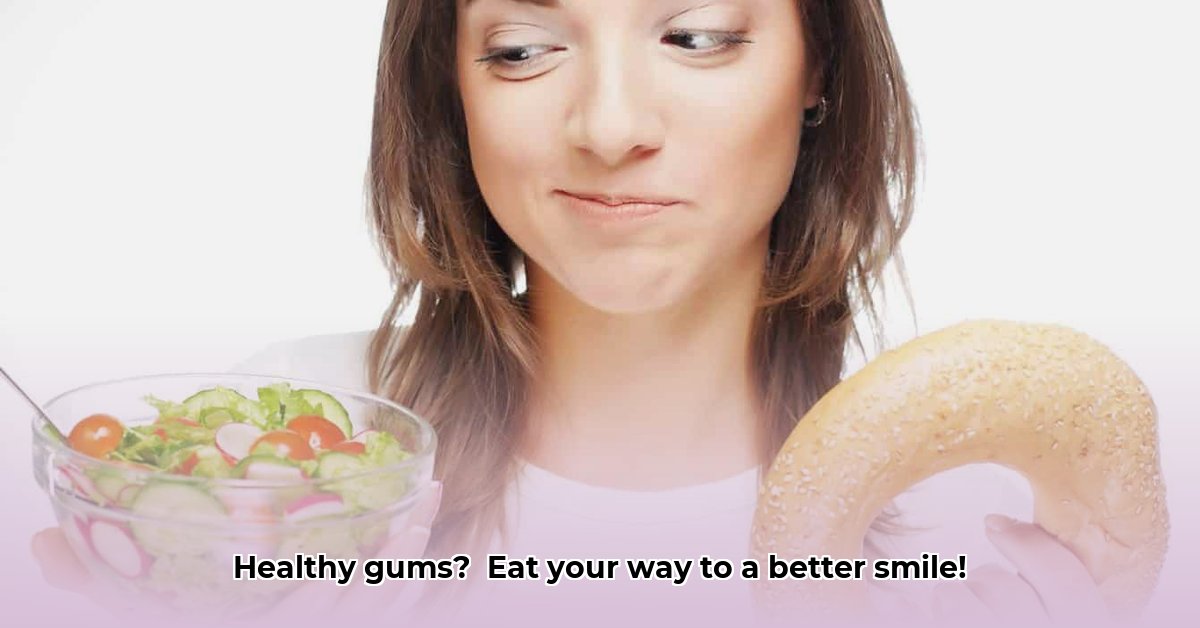Gum disease affects millions, but a proactive approach to your diet can significantly improve your gum health. This guide explores how smart food choices can help prevent and manage gum disease. We’ll highlight the best foods for nourishing your gums, identify dietary habits to avoid, and provide simple strategies for incorporating these tips into your daily life. Remember, this information complements, not replaces, professional dental care. Regular checkups and proper oral hygiene are vital! For more detailed dietary advice, check out this helpful resource: healthy eating guide.
The Importance of Diet for Healthy Gums
Maintaining healthy gums is about more than just a bright smile; it’s a key part of your overall health. Your diet significantly influences the strength and resilience of your gums. This guide will help you nourish your gums and proactively prevent potential problems. The most effective approach combines a balanced diet with regular dental visits and consistent oral hygiene – a holistic strategy for a healthy, vibrant smile!
Understanding Gum Disease: The Foundation
Gum disease includes gingivitis (mild inflammation) and periodontitis (a severe infection). It involves inflammation and microbial imbalances in your mouth. Imagine your mouth as a delicate ecosystem; too much “bad” bacteria can cause irritation and damage. A poor diet, especially one high in sugary snacks and drinks, fuels harmful bacteria, leading to inflammation and potential gum complications. A nutritious diet strengthens your mouth’s defenses!
Superfoods for Gum Health: Your Nutritional Arsenal
Certain foods provide unique protective benefits, acting like superheroes for your gums. Let’s explore the nutritional powerhouses that are essential for maintaining optimal gum health, protecting against periodontitis, and promoting overall dental well-being.
1. Coenzyme Q10 (CoQ10): The Cellular Energizer: CoQ10 is an antioxidant that supports cellular energy production and has anti-inflammatory properties. It’s found in organ meats (liver, heart), but also in chicken, fatty fish, and whole grains. Studies have shown a link between CoQ10 deficiency and gum disease, making it a vital nutrient for gum health.
2. Omega-3 Fatty Acids: The Inflammation Fighters: These healthy fats are potent inflammation reducers. You’ll find them in abundance in fatty fish like salmon, mackerel, and herring, as well as in flaxseeds, chia seeds, and walnuts. Aim for at least two servings of fatty fish per week. Consider an omega-3 supplement if you don’t regularly consume these foods.
3. Vitamin C: The Collagen Builder: Vitamin C is essential for building and repairing collagen, the protein that forms the connective tissues in your gums. Think of collagen as the “glue” that holds everything together. Load up on vitamin C-rich foods like bell peppers (especially red ones!), broccoli, citrus fruits (oranges, grapefruit), and strawberries.
4. Probiotics: The Microbiome Balancers: Your mouth has its own complex community of bacteria, and a balanced microbiome is crucial for gum health. Probiotics are beneficial bacteria that help keep things in check. Incorporate foods like yogurt (especially Greek yogurt with live cultures), kefir (a fermented milk drink), sauerkraut (fermented cabbage), and kimchi (Korean fermented vegetables) into your diet to support a healthy oral microbiome.
5. Collagen: The Gum’s Building Block: Collagen is vital for strong and healthy gum tissue. Bone broth is a fantastic natural source. Chicken skin also contains collagen, but consume it in moderation due to its fat content. Some people use collagen supplements, but consult your dentist or doctor first.
6. Beta Carotene: The Vitamin A Precursor: Beta carotene converts to Vitamin A in the body, an essential nutrient for reducing gum inflammation and supporting the healing process. Sweet potatoes, carrots, and leafy green vegetables are excellent sources.
| Nutrient | Key Benefits | Great Food Sources | Easy Ways to Add Them to Your Diet |
|---|---|---|---|
| CoQ10 | Supports cellular energy, reduces inflammation | Organ meats, chicken, fatty fish, whole grains | Include chicken in meals, consume fatty fish regularly |
| Omega-3 Fatty Acids | Reduces inflammation, supports overall health | Salmon, tuna, flaxseeds, walnuts, chia seeds, mackerel | Grill salmon, sprinkle flaxseeds on yogurt, add walnuts to salads |
| Vitamin C | Builds collagen, strengthens gums, boosts immunity | Bell peppers, broccoli, citrus fruits, strawberries | Add to smoothies, salads, or enjoy as snacks. |
| Probiotics | Balances oral bacteria, improves digestion | Yogurt, kefir, sauerkraut, kimchi | Include in breakfast, add to salads or as a side dish. |
| Collagen (natural) | Supports gum tissue structure | Bone broth, chicken skin (in moderation) | Use bone broth in soups or stews; enjoy chicken skin (sparingly) with meals. |
| Beta Carotene | Reduces inflammation, supports healing | Sweet potatoes, carrots, leafy greens | Roast sweet potatoes, snack on carrots, add greens to salads |
Foods to Avoid: The Gum Health “No-Nos”
While focusing on beneficial foods is key, it’s also important to be mindful of foods that can negatively impact your gum health. Here are the foods to limit or avoid:
- Sugary Drinks: Sodas, juices (even “natural” ones!), sweetened teas, and sports drinks contribute significantly to gum problems. The sugar feeds harmful bacteria, leading to inflammation and cavities.
- Processed Carbohydrates: White bread, pastries, and many processed snacks tend to stick to your teeth and provide extra fuel for those pesky bacteria. Choose whole grains whenever possible. Starches can get stuck in the mouth and in between teeth, increasing your risk for plaque as well.
- Sugary Snacks: Candies, pastries, cookies, and cakes feed harmful bacteria, increasing plaque and acid production that erodes enamel and irritates gums.
- Acidic Foods and Drinks: Citrus fruits (in excess), tomatoes, and vinegar-based dressings can erode tooth enamel, making teeth more vulnerable to bacterial attack and gum irritation.
- Alcohol: Alcohol can dry out the mouth, reducing saliva production, which is essential for flushing away bacteria and food particles.
Creating Your Gum-Healthy Diet: A Simple Plan
Building a gum-friendly diet doesn’t have to be complicated. Think gradual changes – small adjustments that become healthy habits. Start by swapping sugary sodas for water, or adding a serving of fruits or vegetables to each meal. Opt for nutrient-rich alternatives – for example, try air-popped popcorn instead of chips. It’s all about making mindful choices that positively influence your oral health.
Consistency is key! Consider consulting a registered dietitian who can help you create a personalized plan that meets your specific needs and taste preferences.
Beyond Diet: The Whole Picture
While diet is a significant piece of the puzzle, it’s not the only one! Excellent oral hygiene is just as crucial. This means:
- Brushing: Brush your teeth twice a day for at least two minutes each time, using a fluoride toothpaste.
- Flossing: Flossing daily helps remove food particles and plaque from between your teeth and along the gum line.
- Regular Dental Checkups: Visiting your dentist for professional cleanings and checkups is vital for preventing and managing gum disease.
A healthy diet supports your gums’ natural defenses, but it’s not a replacement for proper oral hygiene and regular professional dental care. Think of it as a powerful team effort: you, your diet, and your dentist working together to keep your gums healthy for years to come.
How to Best Incorporate Probiotics for Gum Disease Prevention
Key Takeaways:
- A healthy diet is crucial for gum health, complementing professional dental care.
- Nutrient-rich foods combat inflammation and support a balanced oral microbiome.
- CoQ10, Omega-3s, Vitamin C, and probiotics are particularly beneficial.
- Avoid sugary drinks, refined carbohydrates, and acidic foods, which fuel harmful bacteria.
- How to best incorporate probiotics for gum disease prevention involves consuming probiotic-rich foods or supplements. More research is needed to determine the optimal strains and dosages, but Lactobacillus and Bifidobacterium strains show promise.
- A balanced diet, coupled with good oral hygiene and regular dental checkups, is essential for long-term gum health.
Understanding Gum Disease
Gum disease, encompassing gingivitis and periodontitis, stems from inflammation and microbial imbalance in your mouth. Poor dietary habits significantly contribute to this. Think of your mouth as a garden; what you feed it impacts its health.
The Power of Nutrition: Your Gum Health Allies
Your diet directly influences your gum health. Certain nutrients, like Vitamin C, are crucial for tissue repair. Others, like omega-3 fatty acids, decrease inflammation. How do you harness these nutrients for optimal gum health?
- CoQ10: Enhances cellular energy and reduces gum inflammation. Include chicken, fatty fish, and whole grains in your diet.
- Omega-3 Fatty Acids: Found in fatty fish (salmon, tuna, mackerel), flaxseeds, chia seeds, and walnuts, these reduce inflammation, a key factor in gum disease. Aim for two servings of fatty fish per week.
- Vitamin C: This essential nutrient supports collagen production, vital for healthy gums. Load up on citrus fruits, berries, and leafy greens to promote collagen synthesis for stronger gums. A daily dose of 75-90 mg is recommended.
- Probiotics: These beneficial bacteria help maintain a balanced oral microbiome. How to best incorporate probiotics for gum disease prevention involves consuming fermented foods like yogurt (with live cultures), kefir, and sauerkraut. Consider a probiotic supplement, but consult your dentist or doctor first.
- Collagen: Your body uses this protein to build and repair connective tissues, including gums. Bone broth, leafy greens, and citrus fruits are good sources.
- Beta Carotene: Reduces inflammation. Sweet potatoes, carrots, and leafy greens are good food sources.
Foods to Steer Clear Of
Sugar and processed carbohydrates are the villains of gum health. They feed harmful bacteria that contribute to inflammation and gum disease. Limit sugary drinks, candies, and processed snacks. Replace them with nutrient-rich alternatives!
Creating a Gum-Healthy Diet Plan
Gradually incorporate these beneficial foods into your daily meals. For instance, start your day with a smoothie packed with berries and spinach. Enjoy a salmon salad for lunch. Incorporate fermented foods as snacks to enhance probiotic intake for gum disease prevention.
| Breakfast | Lunch | Dinner | Snacks |
|---|---|---|---|
| Yogurt with berries | Salmon salad with flaxseeds | Chicken stir-fry with greens | Almonds, kefir, carrots |
| Oatmeal with nuts and seeds | Lentil soup | Baked cod with broccoli | Sliced apple with peanut butter |
| Scrambled eggs with spinach | Tuna salad sandwich on whole grain bread | Lean ground beef with sweet potato fries and broccoli | Hard-boiled egg, kimchi |
Beyond Diet: Holistic Gum Health
Dietary changes are part of the puzzle. They complement, not replace, professional dental care and good oral hygiene. Regular checkups, brushing, flossing – these are non-negotiable for optimal gum health.
Ask the Dentist: The 12 Best Foods to Eat if You Have Gum Disease
Foods to Avoid for Healthy Gums and Preventing Gum Disease
Want healthy gums? Then let’s talk about what you should avoid eating. Your diet plays a huge role in gum health, just as much as brushing and flossing. Let’s explore the foods that can sabotage your smile, leading to inflammation and a higher risk of periodontal disease.
Understanding the Enemy: Why Certain Foods Harm Gums
Gum disease, whether it’s gingivitis (mild gum inflammation) or periodontitis (more severe, impacting bone and tissues), thrives on certain foods. It’s all about the bacteria in your mouth and understanding how specific dietary choices fuel their activity.
Think of your mouth as a garden. Some foods are like fertilizer for beneficial plants, but others feed harmful weeds. Foods to avoid for healthy gums and preventing gum disease are those that fuel the “weeds”—the bacteria that cause gum problems.
These harmful bacteria love sugar. Sugary drinks, candies, pastries—they’re like a feast for these unwelcome guests. The bacteria break down the sugar, creating acids that attack your tooth enamel and irritate your gums. This leads to inflammation, bleeding gums, and eventually, more serious gum disease.
Refined carbohydrates, like white bread and white rice, are almost as bad. They break down quickly into sugars, providing the same fuel for harmful bacteria. The result? More inflammation and a greater risk of gum disease.
The Culprits: Specific Foods to Limit or Avoid
Here’s a list of foods to avoid for healthy gums and preventing gum disease:
- Sugary drinks: Sodas, juices, sweetened teas, and sports drinks contribute significantly to enamel erosion and dental caries.
- Sugary snacks: Candies, pastries, cookies, cakes are prime sources that feed harmful bacteria, leading to increased plaque formation.
- Processed carbohydrates: White bread, white rice, pasta, and other highly processed foods which elevate inflammation and provide fuel for periodontal pathogens.
- Acidic foods and drinks: Citrus fruits (in excess), tomatoes, vinegar-based dressings, and other highly acidic substances, which demineralize tooth enamel, increasing vulnerability to bacterial attacks.
- Sticky candies: Caramels and chewy gummies cling to teeth, prolonging sugar exposure and increasing the risk of decay and gum irritation.
- Hard candies: Sucking on hard candies exposes teeth to a steady stream of sugar. They also pose a risk of chipping or cracking teeth.
- Alcohol: Dries out the mouth, reducing saliva production and allowing bacteria to thrive. Many alcoholic beverages are also high in sugar.
Remember: Moderation is key. An occasional treat won’t derail your gum health, but regular consumption of these foods can significantly increase your risk of gum problems.
Building a Gum-Healthy Diet: A Positive Approach
Focusing on what to avoid is only half the battle for preventing gingivitis and periodontitis. To achieve optimal gum health, you need a balanced, nutritious diet, rich in foods that support healthy gums. This includes foods rich in CoQ10, vitamin C, omega-3 fatty acids, and probiotics.
Regular dental checkups are equally crucial – dietary changes complement, not replace, professional care.
Key Takeaways:
- Foods to avoid for healthy gums and preventing gum disease include sugary drinks, candies, refined carbs, sticky candies, hard candies, acidic foods, and alcohol.
- These foods feed harmful bacteria, leading to inflammation and gum disease, and promoting the development of periodontal disease.
- A balanced diet rich in vitamins, healthy fats, and probiotics is essential for maintaining healthy gum tissues.
- Regular dental checkups are crucial for early detection and treatment of gum disease. Dietary improvements should be viewed as a complementary addition to professional dental care.
Essential Nutrients for Gum Health: A Deep Dive into Dietary Strategies
Key Takeaways:
- A balanced diet plays a vital role in gum health, complementing good oral hygiene.
- Specific nutrients, like Vitamins C and D, CoQ10, Beta Carotene, and Omega-3’s are key for strong gums and reducing the risk of periodontal disease.
- Reducing sugary and acidic foods minimizes gum disease risk by decreasing bacterial growth and enamel erosion.
- Professional dental care remains crucial for optimal gum health, including early detection and treatment of periodontal issues.
Understanding Gum Disease
Gum disease, encompassing gingivitis and periodontitis, is a common ailment. Inflammation and infection are hallmarks of these conditions. Poor diet significantly contributes; think of it as fueling the fire. What you eat directly impacts your gum health.
The Power of Nutrition: Your Gum Health Arsenal
Your diet is a powerful tool for maintaining oral health and preventing periodontal issues. Let’s explore Essential Nutrients for Gum Health: A Deep Dive into Dietary Strategies.
-
Vitamin C: This superstar nutrient is crucial for collagen production, the building block of gum tissue. Think citrus fruits, berries, and leafy greens. A daily dose helps build resistance against gum inflammation.
-
Vitamin D: This vitamin strengthens your immune system, helping combat gum infections and promoting bone density to support teeth. Sunlight provides a natural source of Vitamin D. Fatty fish and fortified foods offer additional support.
-
Calcium: Strong teeth and bones? Calcium’s also a gum-health champion. Dairy products, leafy greens, and fortified foods are your allies in maintaining bone health which supports gum function.
-
Omega-3 Fatty Acids: These fats have anti-inflammatory properties, beneficial for reducing gum inflammation and supporting overall tissue health. Salmon, tuna, and flaxseeds are prime examples. Mackerel, herring, and cod liver oil are also excellent sources.
-
CoQ10: An antioxidant supporting cellular energy production and reduces harmful inflammation. Liver, heart, and kidney are great sources.
-
Beta Carotene Helps to repair damage with high levels of Vitamin A which is another great anti-inflammatory vitamin. Found in Sweet potatoes, carrots, and cantaloupe.
-
Protein: This provides essential building blocks for tissue repair and maintenance of healthy gums. Meat, poultry, beans, and lentils all contribute to this critical process.
Foods to Steer Clear Of
Think of sugary drinks and processed snacks as gum-disease fuel. The bacteria thriving in your mouth feast on this sugar, leading to acid production and gum inflammation that damages the gums. Limit these treats; your gums will thank you.
Creating a Gum-Healthy Diet Plan
Small changes make a big difference. Gradually incorporating these gum-friendly foods improves your overall oral health. We’re not aiming for perfection, just progress in adopting a sustainable diet that minimizes periodontal disease.
A sample meal plan might include:
-
Breakfast: Oatmeal with berries and nuts, providing essential vitamins and minerals for building healthy gum tissue. Scrambled eggs with spinach and a side of Greek yogurt.
-
Lunch: Salad with grilled salmon and leafy greens, delivering omega-3 fatty acids, protein and Vitamin C for fighting inflammation and boosting collagen production. Lentil soup with a whole-grain roll.
-
Dinner: Chicken stir-fry with plenty of vegetables, ensuring a balance of important nutrients and supporting tissue repair. Baked cod with roasted sweet potatoes and broccoli.
Remember, consistency is key!
Beyond Diet: A Holistic Approach
Remember, diet is just one piece of the puzzle. Regular brushing, flossing, and professional dental checkups are non-negotiable. Think of your diet as a supplement, not a replacement for professional dental care and optimal oral hygiene practices. Consider using an electric toothbrush and interdental brushes for more effective cleaning.
- Stainless Steel Food Storage for Healthier, Eco-Friendly Meal Prep - February 27, 2026
- Stainless Food Containers Offer Durable Storage for Everyday Meals - February 26, 2026
- Stainless Steel Containers Offer Superior Food Preservation and Durability - February 25, 2026










